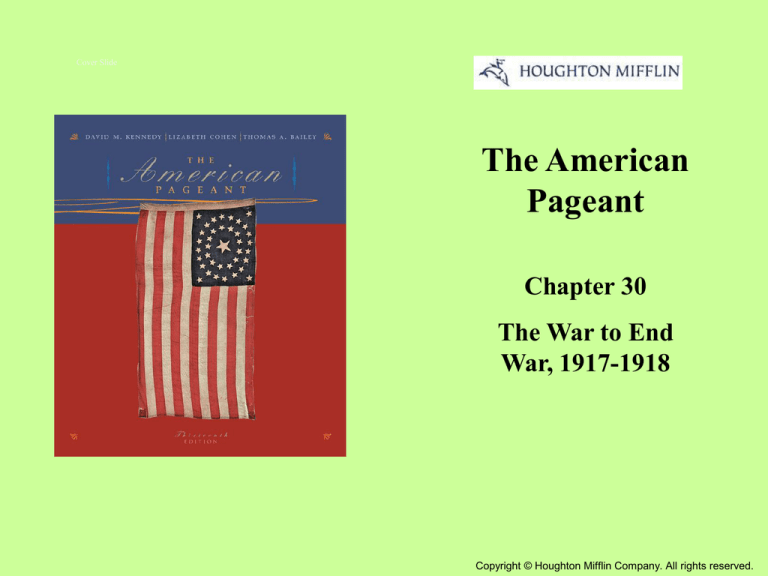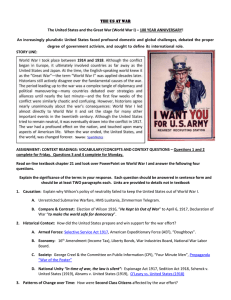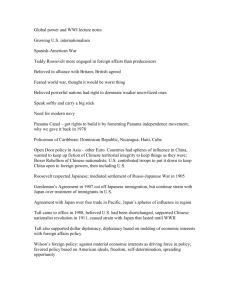
Cover Slide
The American
Pageant
Chapter 30
The War to End
War, 1917-1918
Copyright © Houghton Mifflin Company. All rights reserved.
Wilson gets an education…
• 1914: System of Alliances World War
CATALYST: Assassination of Archduke Franz
Ferdinand of Austria while visiting Serbia
CENTRAL POWERS: Germany, Austria-Hungary,
Ottoman Empire, Bulgaria
ALLIES: France, Belgium, Great Britain, Russia,
Italy, and Japan
AMERICA: Wilson clings to neutrality
Neutrality…Between a rock and a
hard place.
Neutral…
• Immigrants and bonds
with both Central
Powers and Allies
• German saboteurs
• Restraint after
Lusitania
Not so Neutral…
• Loans to Allies
• Supply arms and
munitions to Allies
• Sussex ultimatum
• Zimmerman Note
Hun poster
Hun poster
This poster encouraged Americans to
buy Liberty bonds (that is, loan money
to the government) by emphasizing the
image of the vicious and brutal Hun.
This was part of a larger process of
demonizing the people of the Central
Powers that extended to condemning the
music of Beethoven and the writings of
Goethe. (Collection of Robert Cherny)
Copyright © Houghton Mifflin Company. All rights reserved.
Unterseeboot
http://www.vth.de/modellbau/werft/Wer08_02/32.htm
Lusitania warning
Lusitania warning
Though New York newspapers carried warnings from the German embassy about the dangers
of transatlantic travel, the passengers who boarded the Lusitania on May 1, 1915, probably did
not imagine themselves in serious danger from submarine attack. The ship was sunk on May 7.
Of the 1,959 passengers and crewmembers, 1,198 died, including 128 Americans. (Cobb
Heritage Centre, England; photo by Larry O. Nighswander/NGS) Copyright © Houghton Mifflin Company. All rights reserved.
Lusitania sketch of disaster
Lusitania sketch of disaster
Though New York newspapers carried warnings from the German embassy about the
dangers of transatlantic travel, the passengers who boarded the Lusitania on May 1,
1915, probably did not imagine themselves in serious danger from submarine attack.
The ship was sunk on May 7. Of the 1,959 passengers and crewmembers, 1,198 died,
Copyright © Houghton Mifflin Company. All rights reserved.
including 128 Americans. (Culver Pictures)
ELECTION OF 1916
• TR does not run –
Progressive Rep. Party
fades away
• Wilson runs on record
of progressive reform
and neutrality
• Rep. candidate Charles
Hughes flops – cold
fish that he was.
http://fisher.lib.virginia.edu/collections/stats/elections/maps/1916ec.gif
19 January, 1917:
The Zimmerman Note
to the German Minister to Mexico
On the 1st of February we intend to begin submarine warfare unrestricted.
In spite of this, it is our intention to endeavor to keep neutral the
United States of America. If this attempt is not successful, we propose an
alliance on the following basis with Mexico: That we shall make war
together and together make peace. We shall give general financial support,
and it is understood that Mexico is to reconquer the lost territory in
New Mexico, Texas, and Arizona. The details are left to you for settlement
You are instructed to inform the President of Mexico of the above in the
greatest confidence as soon as it is certain that there will be an outbreak
of war with the United States and suggest that the President of Mexico,
on his own initiative, should communicate with Japan suggesting
adherence at once to this plan; at the same time, offer to mediate between
Germany and Japan. Please call to the attention of the President of Mexico
that the employment of ruthless submarine warfare now promises to
compel England to make peace in a few months.
Zimmerman (Secretary of State)
US Goes to War
• Jan. 31, 1917: Germany declares unlimited
submarine warfare – Sussex Pledge void.
• US arms merchant marine
• Mar. 1, 1917: Zimmerman note discovered
• April 6, 1917: US declares war
• Jan. 8, 1918: Wilson’s Fourteen Points Address
WILSON’s IDEAL: “war to end war” and “to make
the world safe for democracy,” makes an appeal
for a new world order of collective security.
U.S. Losses to the German
Submarine Campaign, 1916–
1918
Wilson’s Fourteen Points
I. Open covenants of peace, openly arrived at, after which there shall be
no private international understandings of any kind but diplomacy
shall proceed always frankly and in the public view.
II. Absolute freedom of navigation upon the seas, outside territorial
waters, alike in peace and in war, except as the seas may be closed
in whole or in part by international action for the enforcement of
international covenants.
III. The removal, so far as possible, of all economic barriers and the
establishment of an equality of trade conditions among all the
nations consenting to the peace and associating themselves for its
maintenance.
IV. Adequate guarantees given and taken that national armaments will be
reduced to the lowest point consistent with domestic safety.
V. A free, open-minded, and absolutely impartial adjustment of all
colonial claims, based upon a strict observance of the principle that
in determining all such questions of sovereignty the interests of the
populations concerned must have equal weight with the equitable
claims of the government whose title is to be determined.
Mobilizing for War
THE “GOOD”
• Creel’s propaganda campaign
• AF of L supports mobilization, few strikes
• Economy gears up, largely voluntarily
• Afr.-Americans enter workforce Great Black Migration
• Women enter the workforce 19th Amendment (1920)
THE “BAD”
• Anti-German sentiment grows in public
• Espionage Act of 1917 and Sedition Act of 1918
THE “UGLY”
• IWW (Wobblies) and Eugene V. Debs tried for sedition
• Race riots, esp. St. Louis, Chicago
• Anti-German sentiment, discrimination
• “RED SCARE”
Schenk v. US
Evidence held sufficient to connect the defendants with the mailing of
printed circulars in pursuance of a conspiracy to obstruct the
recruiting and enlistment service, contrary to the Espionage Act of
June 15, 1917.
Incriminating document seized under a search warrant directed against a
Socialist headquarters, held admissible in evidence, consistently with
the Fourth and Fifth Amendment, in a criminal prosecution against the
general secretary of a Socialist party, who had charge of the office.
Words which, ordinarily and in many places, would be within the
freedom of speech protected by the First Amendment may become
subject to prohibition when of such a nature and used in such
circumstances a to create a clear and present danger that they will
bring about the substantive evils which Congress has a right to
prevent. The character of every act depends upon the circumstances in
which it is done.
http://supct.law.cornell.edu/supct/html/historics/USSC_CR_0249_0047_ZS.html
War Economy
•
•
•
•
•
•
Voluntary and laissez-faire (except for trains)
Herbert Hoover organizes food relief for Allies
Voluntary efforts=“victory gardens” & self-denial
Eighteenth Amendment = Prohibition
Voluntary loan subscriptions
Income tax
African American Migration
Northward, 1910–1920
African American family just arrived in Chicago, 1912
African American family just arrived in Chicago, 1912
Labor shortages and high wages drew African Americans from the south to the north.
This family, including members of three generations, posed for a photographer upon
their arrival in Chicago from the south, as part of the Great Migration during World
War I. (Schomburg Center for Research in Black Culture, New York Public Library)
Copyright © Houghton Mifflin Company. All rights reserved.
Leslie's Illustrated News cover from September 29, 1917, "Be Patriotic sign your country's pledge to save the food"
Leslie's Illustrated News cover from
September 29, 1917, "Be Patriotic sign
your country's pledge to save the
food"
A patriotic wartime poster. (Picture
Research Consultants & Archives)
Copyright © Houghton Mifflin Company. All rights reserved.
Poster: "Stenographers We Need You"
Poster: "Stenographers We Need
You"
Many government agencies used posters
to appeal to the American people for
help in winning the war. This one, from
the U.S. Employment Service,
encouraged women to enter the work
force. (National Archives)
Copyright © Houghton Mifflin Company. All rights reserved.
Getting… “Over there…”
• Conscription of men 18-45
• 379,000 Armed Forces increased to 3.7 million!!!
• Women and African-Americans enlist
(Harlem Hellfighters vs. “construction battalions)
• Led by Gen. “Blackjack” Pershing
• Arrive in France with little training
• First Americans arrive in spring of 1918, one year
after declaration of war, and just in time!
• 5,000 US troops go to Archangel, Russia
• 10,000 US troops go to Siberia
Parade of recruits WWI, photo by Harry M. Rhodes
Parade of recruits WWI, photo by Harry M. Rhodes
In Denver, automobiles carrying young army recruits parade through the city.
(Denver Public Library, Western History Division)
Copyright © Houghton Mifflin Company. All rights reserved.
Blacks at the front
Blacks at the front
Black troops of the 369th Infantry Regiment in the trenches near Maffrecourt,
France, in 1918. Most African American soldiers were assigned to noncombat duty,
such as unloading supplies and equipment. ()
Copyright © Houghton Mifflin Company. All rights reserved.
Fighting…”Over there…”
•
•
•
•
•
1917 Russian Revolution w/d from fight in 1918
Germany focuses on EASTERN FRONT
Spring 1918: Germans w/in 40 miles of Paris
30,000 US troops turn tide at Chateau-Thierry
Pershing directs US forces in Meuse-Argonne
offensive
• Argonne Forest: 120,000 KIA or casualties (10%)
• US “tactics” lead to high casualties
http://www.bbc.co.uk/schools/worldwarone/hq/causes1_01.shtml
http://www.bbc.co.uk/history/war
/wwone/launch_ani_western_fron
t.shtml
European Alliances and
Battlefronts, 1914–1917
The
Western
Front:
U.S.
Participation
1918
Company K
Company K
A U.S. soldier of Company K, 110th Infantry Regiment, receives aid during fighting
at Verennes, France. (National Archives)
Copyright © Houghton Mifflin Company. All rights reserved.
http://www.pilotfriend.com/century-of-flight/Aviation%20history/airplane%20at%20war/images/17a.jpg
noviomagus.tripod.com
http://www.diggerhistory.info/images/trenches/turks-trench-anzac.jpg
http://www.bbc.co.uk/schools/worldwarone/hq/wfront2_02.shtml
http://home.hccnet.nl/h.van.oerle/landshp/landshp2.htm
http://www.bbc.co.uk/schools/worldwarone/hq/wfront1_02.shtml
http://www.bbc.co.uk/schools/worldwarone/hq/wfront1_02.shtml
http://www.firstworldwar.com/weaponry/machineguns.htm
Vittorio Orlando - Italian premier David Lloyd George - British prime minister
Georges Clemenceau - French prime minister Woodrow Wilson - American president
LEAGUE OF NATIONS
http://rutlandhs.k12.vt.us/jpeterso/uboatcar.htm
IDEALISM FAILS?
• Americans hand 1918 mid-term elections to
Republicans.
• Wilson excludes Republican from Paris peace
delegation.
• Though popular in Europe, Wilson’s plans for peace are
dismissed by Allied leaders.
• 14 Points are NOT followed in Versailles Treaty.
• Allies take control of colonial possessions of Central
Powers – NOT freed or democratic.
• Russia largely excluded from “spoils.”
• “Self-determination” IGNORED: “Trusteeships” instead.
"The Prisoners and the Wounded," October, 1918 by Harvey Dunn
"The Prisoners and
the Wounded,"
October, 1918 by
Harvey Dunn
Harvey Dunn's 1918
painting (detail) of
weary soldiers in the
First World War
captures the misery of
frontline battle.
(Smithsonian Institute,
Division of Political
History, Washington,
D.C.)
Copyright © Houghton Mifflin Company. All rights reserved.
WILSON DISILLUSIONED
http://www.authentichistory.com/images/ww1/cartoons/league_of_nations_11.html
TREATY OF VERSAILLES AND REPARATIONS
•
•
•
•
•
•
•
•
Fourteen Points
Reduce military to the
'lowest point consistent
with domestic safety'.
'Impartial adjustment of all
colonial claims‘
Leave Russian territory
Leave Belgium
Leave France and return
Alsace and Lorraine
Italy gets back the land that
Austria-Hungary had
taken.
'An independent Poland to
be established, with free
and secure access to the
Sea'
'Freedom of the Seas.‘
Adapted from
http://www.bbc.co.uk/schools/worldwar
one/hq/outcomes3_01.shtml
Treaty of Versailles
•
•
•
•
•
•
•
•
Germany’s army was reduced to 100,000 men. They were
forbidden to have tanks or an air force. The Rhineland - was
made into a demilitarized zone. Allied troops were stationed
there for fifteen years.
Britain and its Dominions split up the main African
colonies. Germany was forced to renounce claims in Asia.
Some of the land that Germany had taken in Brest-Litovsk
was made into new states: Estonia, Lithuania and Latvia.
Belgium was also given some German territory.
Alsace-Lorraine was given to France. France also received
the coal mines Germany's Saar Basin, though the area was
to be governed by the League of Nations. However,
Denmark and Czechoslovakia received German territory.
Italy received territory that was promised by the Allies in
the secret Treaty of London. No more.
Territory from Russia taken by the Germans was used to
create Poland. Land from East Prussia gave Poland access to
the Sea. Upper Silesia, a strong industrial centre between
Poland and Germany, was given temporary independence.
(Britain protested this)
Europe
After the
Treaty
of
Versailles,
1919
http://www.bbc.co.uk/schools/worldwarone/hq/outcomes3_01.shtml
THE SENATE REJECTS THE LEAGUE
• Republicans oppose the “entangling alliances” of the
League of Nations
• Wilson tours US to raise public support
• Wilson collapses after speech at Pueblo, CO
• Wilson paralyzed and bedridden for more than 7 months
• Lodge amends the treat. A bitter Wilson urges
Democrats to vote treaty down.
• Disenchanted and disillusioned, US swings toward
isolationism.
• Republican Warren Harding elected President in 1920.
Wilson, unwilling to compromise, helps defeat the US
ratification of the League.
Wilson after his stroke, 1919
Wilson after his stroke, 1919
In October 1919 President Woodrow
Wilson (1856–1924) receives assistance
after his massive stroke, which made it
difficult for him to maintain his train of
thought and manage government affairs.
Historians continue to debate the
influence of Wilson's poor health on the
president's losing battle for U.S.
membership in the League of Nations.
(Library of Congress)
Copyright © Houghton Mifflin Company. All rights reserved.
Dons in WWI




